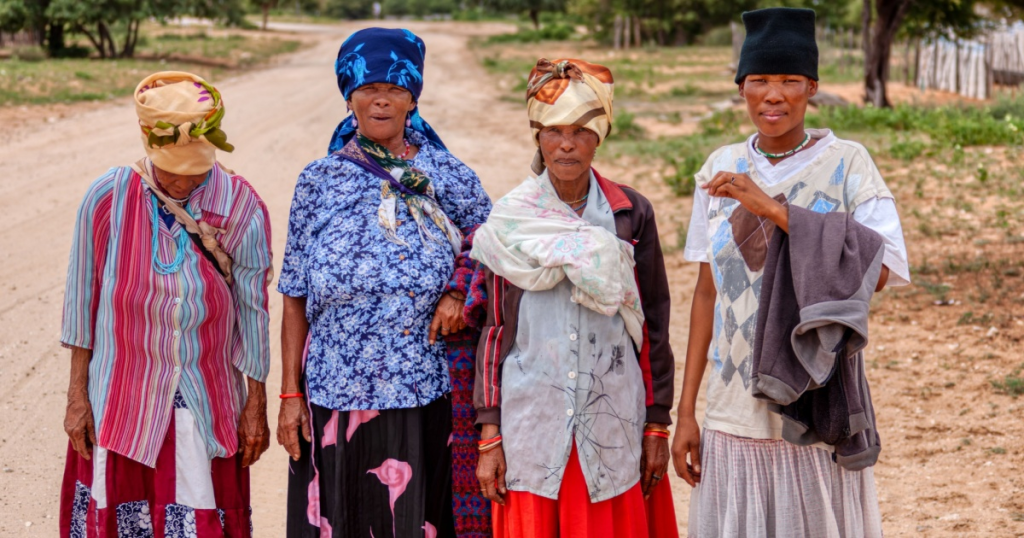At 91 years old, Katrina Esau holds the distinguished title of being the sole remaining fluent speaker of the N|uu language, a linguistic rarity originating from the indigenous people of South Africa. This ancient tongue has teetered on the brink of extinction for decades, the victim of a painful history of colonial oppression and the country’s apartheid policies.
Growing up, Esau was harshly discouraged from using her native N|uu, and instead forced to speak Afrikaans – the language of the ruling white minority. However, rather than allowing this vital part of her cultural heritage to be silenced forever, Esau spent much of her life working tirelessly to revive and preserve the N|uu language.
Determined to ensure the survival of N|uu, the nonagenarian Esau founded a school in her hometown of Upington, with the goal of teaching the language to a new generation. Through these remarkable efforts, Esau has played a crucial role in safeguarding the future of N|uu, ensuring it will not fade into obscurity.

Despite having two living sisters, Esau has no one to speak her language with, aside from the family members and children she had taught a few phrases. “I miss speaking to someone,” she said. “It doesn’t feel good. You talk, you walk, you know … you miss someone who can just sit with you and speak N|uu with you.”
Esau’s granddaughter, language activist Claudia Snyman, has joined her grandmother’s campaign to bring back N|uu. They had worked together to open a school to teach the language, but it was sadly vandalized during the pandemic, which greatly hurt their progress. “The language isn’t where it’s supposed to be yet. If Ouma [grandmother] dies, then everything dies,” said Snyman in 2023. Her dream is to protect her grandmother’s legacy. “I’ll do anything in my power to help her to prevent this language from dying.”
N|uu is a click language dating back to the ǂKhomani people from the southern Kalahari who lived in Southern Africa before the arrival of European colonizers. They are a part of the San people who were one of the earliest known hunter-gatherers in that area. During the British occupation in the 19th century, the people were stripped of their ethnic and cultural identity, including their language. In fact, people were mocked, beaten, and even murdered for using N|uu. This endangered the language, almost erasing it completely.
Although N|uu has evolved with time, like any other language, it retains great significance from a history and culture that has almost been forgotten. “During colonialism and apartheid, Ouma Katrina and other (indigenous) groups were not allowed to speak their languages, their languages were frowned upon, and that is how we got to the point where we are with minimal speakers,” said Lorato Mokwena, a linguist from South Africa’s University of the Western Cape. “It’s important that while Ouma Katrina is around, that we do the best that we can to preserve the language and to document it.”

Image credit: Because of Them We Can
Known as N|uu, this ancient language is characterized by the distinctive “click” sounds that punctuate its speech, a phenomenon found in only a handful of languages globally. For decades, the preservation of this linguistic treasure has been a race against time, as the last known fluent speaker, Ouma Katrina Esau, fought to keep the language alive.
At the heart of the N|uu language is the captivating “bilabial plosive” – a sound often described as a “kiss click.” This unique articulation, produced by a sudden release of air between the lips, is one of the primary features that sets N|uu apart from other languages.

Image credit: Paul Weinberg / University of Cape Town Libraries
“The ‘kiss click’ is a fascinating linguistic phenomenon,” explains Dr. Kerry Jones, a linguist and Director of African Tongue. “It’s a sound that very few languages in the world possess, and it’s a testament to the ingenuity and creativity of the Khoikhoi and San peoples.”
As the world has become increasingly globalized, the fate of many indigenous languages has hung in the balance. N|uu, once spoken by a thriving community, has faced the prospect of extinction for decades. By the 1990s, only about 20 people remained who could fluently converse in the language.
Enter Ouma Katrina Esau, a woman who would become the last known fluent speaker of N|uu. Determined to preserve her people’s linguistic and cultural heritage, Esau partnered with linguists and researchers to document the language and create educational resources for future generations.

Unveiling ceremony: Khoisan San N|uu language dictionary written by Her Excellency ǂXuu Katrina Esau. Photo: Lerato Maduna. Image Credit: UCT
Esau’s tireless efforts to save N|uu have not gone unnoticed. In March 2023, she was awarded an honorary doctorate from the University of Cape Town for her contributions to the preservation of the language. She was also honored with the Order of the Baobab in Silver by the Republic of South Africa, recognizing her “excellent contribution to the preservation of a language that is facing a threat of extinction.”
“Who would have thought that a woman who never saw the inside of a school, who looked after sheep and cleaned kitchens on her hands and knees, would be here today?” Esau said during the ceremony that unveiled the completed N|uu dictionary, both in hardcover and digital formats.
Despite the challenges, Esau’s work has not been in vain. Her granddaughter, Claudia, has already begun learning the language, becoming a fluent speaker in her own right. And with the creation of the N|uu dictionary and the establishment of a learning program at a local school, the hope for the language’s survival has been reignited.

Image credit: UCT
“Children are learning to greet, they are learning to sing songs, they are learning names for animals and plants,” says Dr. Jones. “They’re not going to be fluent speakers and be fully monolingual in N|uu. That’s not reality, but they will be able to greet, they will be able to sing songs, they will be able to understand a basic children’s story.”
The story of N|uu and Ouma Katrina Esau’s fight to keep it alive serves as a poignant reminder of the importance of preserving endangered languages. These linguistic and cultural treasures are not mere relics of the past; they represent a unique way of understanding the world, a repository of traditional knowledge, and a fundamental aspect of human identity.

Image credit: UCT
“There are these codes that we use to communicate and we label these codes ‘languages,'” explains Dr. Jones. “Your experience with one code or another code is the structure that creates your reality. That is fascinating. Because of globalization, we are losing access to these codes. That’s such a loss. It’s the same as saying ‘Well, why give a sh*t about animals and plants that are going extinct?’ It’s because it’s part of a bigger network – it’s important.”
As the world continues to evolve, the race to preserve endangered languages like N|uu becomes ever more crucial. The story of Ouma Katrina Esau and her tireless efforts to safeguard the unique “click” language of her people serves as a powerful reminder of the richness and diversity that is at risk of being lost.
Through the establishment of educational programs, the creation of digital resources, and the continued efforts of dedicated individuals and communities, the hope remains that the captivating sounds of N|uu and other endangered languages will continue to be heard and celebrated for generations to come.


